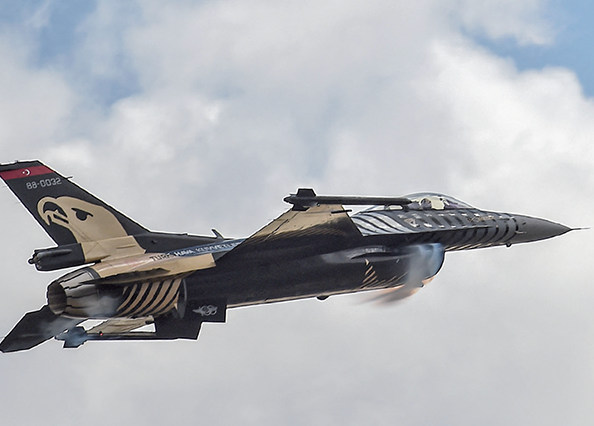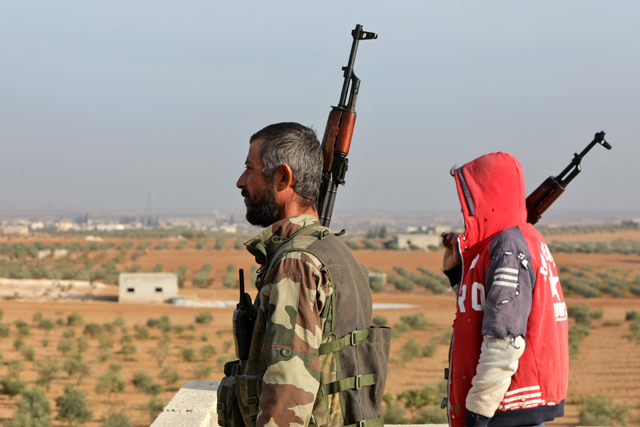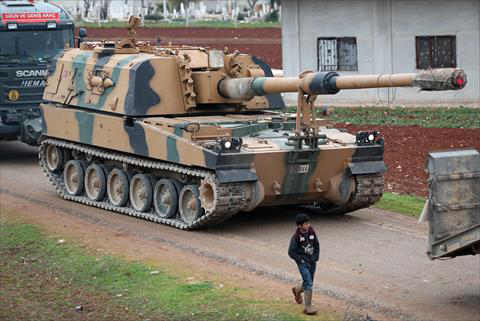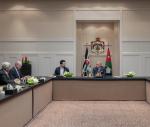You are here
Turkey launches air raids against Kurdish militants in Syria, Iraq
By AFP - Nov 21,2022 - Last updated at Nov 21,2022

In this file photo taken on September 20, 2018, Solo Turk, the aerobatic team of the Turkish Air Force, fly their F-16 Fighters over Istanbul's new airport. Turkey announced on Sunday, it had carried out air strikes against outlawed Kurdish militant bases across northern Syria and Iraq (AFP photo)
BEIRUT/ISTANBUL — Turkish air strikes overnight killed at least 31 people in northern Syria, primarily in positions held by Syrian Kurdish forces, a Britain-based war monitoring group said on Sunday.
Nearly 25 strikes hit Raqa, Hassakeh and Aleppo provinces, killing 18 members of the Kurdish-led Syrian Democratic Forces, 12 members of Syria's military and one journalist, said the Syrian Observatory for Human Rights.
Turkey announced on Sunday it had carried out air strikes against the bases of outlawed Kurdish militants across northern Syria and Iraq, which it said were being used to launch "terrorist" attacks on Turkish soil.
The offensive, codenamed Operation Claw-Sword, comes a week after a blast in central Istanbul that killed six people and wounded 81.
Turkey blamed the attack on the Kurdistan Workers' Party (PKK), which has waged a bloody insurgency there for decades and is designated a terror group by Ankara and its Western allies. The PKK has denied involvement in the Istanbul explosion.
“Air Operation Claw-Sword was successfully carried out, within the scope of our strategy to eradicate terrorism at its source and eliminate terror attacks against our people and security forces from northern Iraq and Syria,” the defence ministry said in a statement.
The raids targeted PKK bases in northern Iraq’s mountainous regions of Kandil, Asos and Hakurk, as well as bases of the Kurdish People’s Protection Units (YPG), in Ayn Al Arab (called Kobani in Kurdish), Tal Rifaat, Jazira and Derik regions in Syria, the ministry said. Ankara considers the YPG an extension of the PKK.
Of all, 89 targets including shelters, bunkers, caves, tunnels, ammunition depots, so-called headquarters and training camps belonging to the militants “were destroyed”, the ministry said, adding “many terrorists were neutralised”, including the militant groups’ leaders.
“All our planes safely returned to their bases after the operation,” it added.
Defence Minister Hulusi Akar was seen in a video image briefing President Recep Tayyip Erdogan, who gave the order for the latest operation, which the Syrian defence ministry said killed a number of its soldiers.
The Istanbul bombing was the deadliest in five years and evoked bitter memories of a wave of nationwide attacks from 2015 to 2017 that were attributed mostly to Kurdish militants or the Daesh terror group extremists.
No individual or group has claimed responsibility.
‘Hour of reckoning’
After the explosion, Turkish authorities arrested more than a dozen people, including chief suspect Alham Albashir, a Syrian woman who is said to have been working for Kurdish militants.
Bulgaria has also detained five people accused of having helped one of the suspects.
“The hour of reckoning has come,” the Turkish defence ministry tweeted early on Sunday, along with a photo of a plane taking off for a night operation.
“Terrorist hotbeds razed by precision strikes,” the ministry said in another post, which was accompanied by a video showing a target being selected from the air followed by an explosion.
In its first comment on the Turkish strikes, the Syrian defence ministry said “a number of soldiers” were killed due to “Turkish aggressions in northern Aleppo and Hassakeh provinces at dawn”.
The raids killed at least 11 members of the Kurdish-led Syrian Democratic Forces (SDF) and 10 Syrian regime soldiers, said the Syrian Observatory for Human Rights (SOHR), a Britain-based monitoring group that has an extensive network of contacts across the country.
The SOHR said the strikes killed only fighters while the SDF said that 11 civilians died.
Turkey’s military has in the past denied claims that its strikes target civilians.
‘Bombing threatens whole region’
Turkey’s latest military push could create problems for Ankara’s complex relations with its Western allies, particularly the United States, which has relied mostly on Syrian Kurdish militia forces in its fight against Daesh extremists.
But Turkey considers the YPG a terror group linked to the PKK and has often accused Washington of supplying arms to the Kurdish militias in Syria.
Interior Minister Suleyman Soylu rejected the United States’ message of condolences after the Istanbul attack, even though Erdogan accepted them during a meeting on Tuesday with President Joe Biden on the margins of the G-20 summit in Indonesia.
Soylu has said Ankara believes the order for the Istanbul attack was given from Kobani, controlled by Syrian Kurdish militia forces, which have also denied any role.
Kobane, a Kurdish-majority town near the Turkish border, was captured by Daesh in late 2014 before Syrian Kurdish forces drove them out early the following year.
“Turkish bombing of our safe areas threatens the whole region,” Mazloum Abdi, the chief commander of the US-allied SDF, tweeted.
Turkey has launched waves of attacks on Syria since 2016 targeting Kurdish militias as well as Daesh extremist, and Ankara and forces backed by it have seised territory along the Syrian border.
Since May, Erdogan has threatened to launch a new operation in northern Syria.
Related Articles
ISTANBUL — Turkish President Recep Tayyip Erdogan said Monday he was mulling going beyond air strikes and launching a ground operation in Sy
QAMISHLI — Turkish strikes Wednesday targeted Kurdish forces controlling northern Syria's Al Hol detention camp, home to over 50,000 people
ISTANBUL/BEIRUT — Turkish planes bombed Kurdish fighters in Iraq's Sinjar region and northeast Syria on Tuesday, killing at least 20 in a wi
















